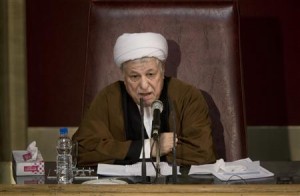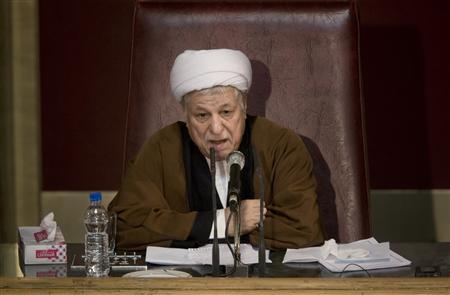
(Reuters) - New candidates entered Iran's presidential race on Saturday on opposite sides of the divide between loyal defenders of Supreme Leader Ayatollah Ali Khamenei and opponents accused of threatening to undermine him.
Amid intense speculation on the final day of registration, two former presidents kept Iranians guessing on whether they would join the contest to succeed President Mahmoud Ahmadinejad, who has long been at odds with Khamenei.
Ahmadinejad's former press adviser Ali Akbar Javanfekr became the first high-profile member of the president's entourage to enter the fray. Javanfekr was sent to prison last year for publishing an article about Islamic dress that was deemed offensive to public decency, in a ruling that Ahmadinejad called unjust.
Early on Saturday, Iranian media reported the registration of the charismatic mayor of Tehran, Mohammad Baqer Qalibaf, a member of a three-man coalition of "Principlists" - loyal defenders of Khamenei and the theocratic system who are, by implication, hostile to Ahmadinejad.
About 400 candidates have already registered for the June 14 vote, which is shaping up as the most uncertain in decades. It is the first since Ahmadinejad's disputed re-election in 2009, when mass "Green movement" protests erupted after the defeat of reformist candidates Mirhossein Mousavi and Mehdi Karoubi.
Since then, proponents of greater social and political freedoms have been suppressed or sidelined. Mousavi, his wife and Karoubi have been under house arrest for over two years.
The outcome of next month's vote will signal the extent of Khamenei's control at the summit of power in the Islamic Republic, whether he feels the need to reach out to opposition groups, and whether reformists are capable of making a comeback.
RAFSANJANI RETURN?
Another pro-Khamenei candidate, Gholam-Ali Haddad-Adel, registered on Friday and a third, former foreign minister Ali Akbar Velayati, followed suit on Saturday.
Two other leading Principlists, Mohammad Hassan Abu-Torabi Fard and former health minister Kamran Baqeri Lankarani, are also running, as is Mohsen Rezaie, who headed the Revolutionary Guards and lost to Ahmadinejad in 2009.
Candidates in the rival camp include moderate cleric Hassan Rohani, a former nuclear negotiator under reformist president Mohammad Khatami, and several other reformists including former member of parliament Mostafa Kavakebian and Mohammad Aref, a vice president under Khatami.
But the biggest political hitters, former presidents Khatami and Akbar Hashemi Rafsanjani, have left it to the last minute to make their decision.
Khatami retains much popularity but is viewed with suspicion by conservatives for his support of Mousavi four years ago. He has not officially ruled himself out, but on Friday endorsed Rafsanjani and said he hoped he would run.
Security forces were deployed around Khatami's office in Tehran on Saturday morning and made some arrests, opposition website Kaleme reported.
Rafsanjani, 78, has indicated he may run but only if the supreme leader consents. He has some support among reformists because of his backing of the opposition movement in 2009.
"The chance of Mr Rafsanjani becoming a candidate is not small," said Mohammad Hossein Ziya, who campaigned in 2009 for Karoubi and now runs a website from the United States. "If Mr Rafsanjani becomes a candidate, I think the reformists and some portion of the Principlists will support him."
The leadership around Khamenei especially fears a campaign by Ahmadinejad aide Esfandiar Rahim Mashaie, viewed with intense distrust by conservatives who see him as leading a "deviant current" that seeks to set aside clerical influence in favor of a more nationalistic doctrine.
All candidates must be vetted by a conservative body of clerics and jurists known as the Guardian Council, which can disqualify any candidate without offering a justification. It typically narrows the field to just a handful of men. Only eight women have registered so far.
But there appears to be little of the popular enthusiasm for the vote that there was in the run-up to the 2009 election, when many sensed a possibility of real change.
After years of ever tougher international sanctions over Tehran's nuclear program, many Iranians care more about the economy than political infighting.
"A large portion of people either don't want to participate or they are so worried about economic issues that they don't see political activities as a priority," Ziya said.
By Reuters
The Iran Project is not responsible for the content of quoted articles.











